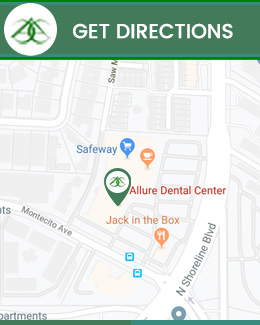Wisdom Teeth Removal: Procedure & Recovery Q&A
Experience the streamlined process and smooth recovery of wisdom teeth removal with our expert dentists Dr. Trinh Lee and Dr. Suzanna Lee at Allure Dental. Under the careful guidance of our skilled professionals, you’ll undergo a precise procedure tailored to your needs, ensuring minimal discomfort and optimal results. Trust in our comprehensive post-operative care regimen, designed to support your recovery journey, so you can get back to smiling confidently in no time. For more information, contact us or schedule an online appointment. We are conveniently located at 570 N Shoreline Blvd Mountain View, CA 94043.


Table of Contents:
How do dentists at Allure Dental Center remove wisdom teeth?
How long does wisdom tooth removal take?
How long does it take to recover from wisdom tooth removal?
Why do wisdom teeth need to be removed?
Dr. Trinh Lee and Dr. Suzanna Lee typically remove wisdom teeth through a surgical procedure called wisdom tooth extraction. Here’s the process:
1. Preparation: Before the procedure, the dentist will:
● Take X-rays to assess the location and condition of the wisdom teeth.
● Go over the procedure and any possible risks or complications with the patient.
● Provide anesthesia or sedation to help the patient relax and manage pain.
2. Surgical procedure: During the surgical portion, the dentist will:
● Make a tiny cut into the gums to get to the wisdom tooth.
● Use a specialized instrument to gently rock the tooth back and forth, allowing it to loosen from its socket.
● Remove the tooth from the socket, taking care not to damage surrounding tissues.
● If necessary, remove any remaining roots or fragments.
3. Stitching and closure: After the surgical procedure, the dentist will:
● Close the incision with stitches or dissolvable sutures.
● Apply a medical covering or bandage to keep the wound clean and promote healing.
4. Aftercare: After your procedure you will:
● Rest and avoid strenuous activities for 24-48 hours.
● Take pain medication as instructed to handle discomfort.
● Avoid eating or drinking until the numbness wears off and bleeding stops.
● Follow a soft food diet for several days to reduce discomfort and prevent irritation.
The entire treatment time is usually around 30-60 minutes per tooth, depending on the difficulty of the extraction and the patient’s overall health. The dentist may also recommend antibiotics or pain medication to aid in the healing process.
The time it requires to remove wisdom teeth can be different for everyone due to the complexity of the extraction, the exact number of teeth being removed, and the patient’s overall health. Typically, a simple extraction can take around 30-60 minutes per tooth, whereas a surgical extraction may take around 60-90 minutes per tooth. If multiple wisdom teeth are being removed, the procedure can take anywhere from 1-2 hours.
In general, the procedure can last from 30 minutes and up to 2 hours, based on the unique circumstances. Your dentist will give you a much more accurate estimate of the time needed for your procedure during your consultation.
The recovery time from wisdom tooth removal can take weeks to months, based on the person’s healing process and the level of seriousness of the extraction. In general, it’s common for patients to take 4-6 weeks to fully recover from a simple extraction, and up to 3-6 months to recover from a surgical extraction. During this time, you may experience ongoing pain, swelling, and bruising, as well as numbness or tingling in the affected area. Additionally, some patients may require follow-up appointments with their dentist to assess the healing process and to make sure that the extraction site is healing correctly.
Wisdom teeth typically require removal because they tend to cause problems for the teeth and gums around them. Some common reasons for removing wisdom teeth include:
• Overcrowding, which can cause teeth to become misaligned or crooked, leading to issues with biting and chewing, as well as increased risk of tooth decay and gum disease.
• Impaction, when the tooth does not have the space to erupt properly and can become trapped in the jawbone or gum tissue, is another common issue. Impaction can cause pain, swelling, and infection, and can even lead to damage to surrounding bone and tissue. In some instances, impacted wisdom teeth could cause cysts or tumors to develop around the tooth, which can further complicate the issue.
• Infection is also a very common problem that comes along with wisdom teeth, as bacteria and food particles can get trapped in the tooth and gum tissue, leading to abscesses and other complications. Additionally, wisdom teeth can also be difficult to clean and maintain, making them more prone to decay and other oral health issues.
In many instances, it is advised to remove the wisdom teeth to prevent these problems from occurring in the first place. If left untreated, wisdom teeth can cause significant discomfort, pain, and even systemic infections. By removing wisdom teeth, dentists can help prevent these problems and promote overall oral health. For more information, contact us or schedule an online appointment. We serve patients from Mountain View CA, Sunnyvale CA, Los Altos CA, Stanford CA, Menlo Park CA, Atherton CA, Loyola CA, Cupertino CA, Palo Alto CA, Redwood City CA and surrounding areas.




